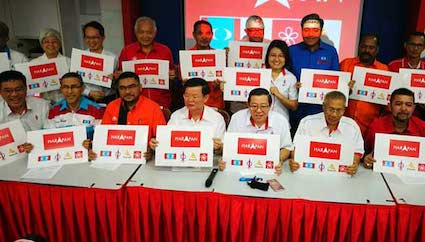In danger of being a one-hit wonder

Philip Golingai, The Star
THE Pakatan Harapan government could end up like Lou Bega’s Mambo No. 5, Right Said Fred’s I’m Too Sexy and Sir Mix-A-Lot’s Baby Got Back if it doesn’t handle reforms properly.
The songs are all one-hit wonders and if Pakatan doesn’t dance to the reform tune it might be a one-term government.
In an analysis, New Malaysia: Four key challenges in the near term, James Chin, who is director of the Asia Institute, University of Tasmania, contended that if reforms were not handled properly, the country could easily revert to the old regime after one term of Pakatan rule.
Chin, in his analysis for The Lowy Institute, an Australian think tank with a global outlook, identified four key areas that the Tun Dr Mahathir Mohamad administration must deal with in the next 12 months.
These issues, he said were not only crucial to the stability of the Pakatan administration, but also for long-term institutional reforms.
The Pakatan administration, said Chin, had acknowledged that the Malay Agenda/Bumiputra Policy needed reform. To bring Malaysia to the next economic level, the Council of Eminent Persons led by Tun Daim Zainuddin suggested that reforms to the affirmative action policies were necessary.
However, Chin said that with only 25% of Malays supporting Pakatan in GE14, Dr Mahathir would continue with the Malay Agenda with some changes.
“In all probability, there is no political appetite to make real changes to the Malay Agenda until PH has won the Malay vote at the next general election, due in 2023. The overriding fear is that if changes are made now, PH will lose Malay support and may even lose the government in the next election,” he said.
If you thought that the Bill – that arguably would make Sabah and Sarawak equal with Peninsular Malaysia – was complex, wait until the government negotiates the MA63 (the 1963 Malaysia Agreement).
I foresee thorny points in the agreement that grants a high degree of autonomy to the two states in Borneo.
For example, Islam’s status as the national religion of Malaysia should not be applicable to Sarawak and Sabah.
Or, English should continue as the official language. Or, Sabah and Sarawak should be given a high degree of autonomy over their financial affairs, such as control of their own finance, development expenditure, and tariffs.
Chin summed up one of the grievances the people of my state and Sarawak feel with their experience being part of the Federation, which they formed in 1963 together with Malaya and Singapore.
“State nationalists argue that Sabah and Sarawak contribute more in economic terms to the federation than they get out of it, especially in oil and gas, and that political neglect has resulted in the underdevelopment of Sabah and Sarawak compared to the peninsula,” he said.
The academic warned that the historical grievances of Sabahans and Sarawakians were real and deep and if it was not dealt with properly at the political level, could provide the impetus for a secession push.
“Small secessionist movements are already active in both states. These could easily gain momentum if Putrajaya continues to ignore historical grievances,” he said.
On the Borneo side of Malaysia, according to Chin, the version of Islam practised was far more liberal and tolerant compared to that in Peninsular Malaysia.
“This is largely due to the population structure. Unlike West Malaysia, where Malays constitute more than half the population, Sabah and Sarawak are plural states with no single ethnic group making up more than 40 per cent of the population,” he said.
In the past three decades in Malaysia, Chin argued that the Muslims vs non-Muslims narrative was promoted.
“The non-Muslim population, especially the Christian community in Malaysia, feel they are under siege by Islamists who are suspicious of anything they deem to be Christian,” he said.
Chin said the three issues mentioned above were not new – they went unresolved under the previous regime, leading to an increasingly dysfunctional political system and culminating in the change of government.
The Pakatan government, he said, has an opportunity to change Malaysia’s political trajectory if it takes steps to resolve them. The immediate issue, the academic said, was the promised transition of power to PKR president Datuk Seri Anwar Ibrahim.
There was persistent talk that Dr Mahathir preferred Datuk Seri Azmin Ali, the PKR deputy president, Chin said.
“Persistent chatter about Anwar Ibrahim’s ability to ascend to the top job is having a destabilising impact on Malaysian politics. In a government in which power is highly centralised in the office of the prime minister, the prime minister’s standing is crucial in maintaining continuity and defusing tensions,” he said.
“Similarly, the Malaysian economy and financial markets do not like political uncertainty, particularly after such an unprecedented regime change. Malaysia has thrived economically in the past, in part because of the political certainty produced by Umno’s long reign.”
Reform. If not, Pakatan politicians and diehards could be singing Billy Ray Cyrus’ one-hit wonder, Achy Breaky Heart, after GE15.

